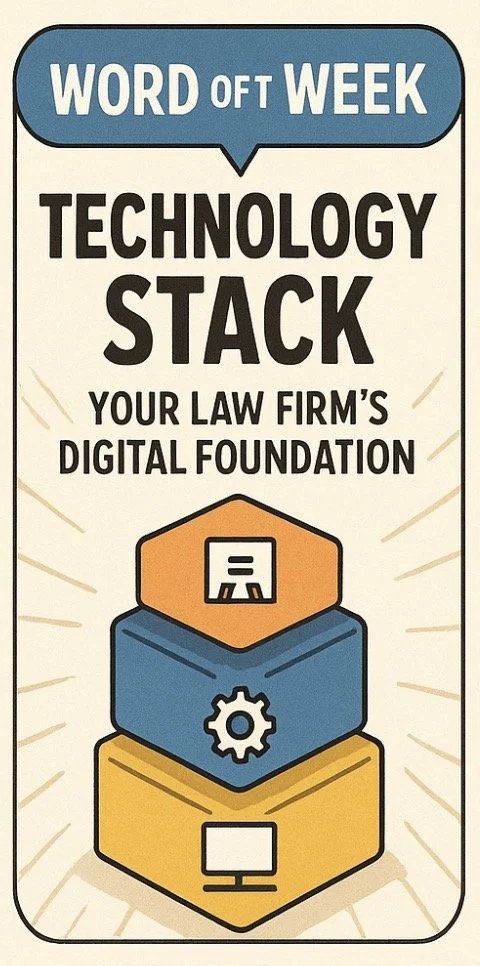Word of the Week: Technology Stack - Your Law Firm's Digital Foundation 📖
/A technology stack (commonly called a tech stack) represents the complete collection of software tools, applications, and technologies that work together to support your law firm's operations. This digital infrastructure powers everything from client communication to case management.
Your tech stack functions like building blocks. Each component serves a specific purpose. The foundation includes your operating system and hardware. The middle layer contains your practice management software and document systems. The top layer delivers the interfaces you interact with daily.
Modern law firms require robust tech stacks to remain competitive. These systems streamline workflows and improve efficiency. They also enhance client service delivery.
A well-designed legal tech stack typically includes practice management software as its core. This central system tracks deadlines, manages contacts, and coordinates team workflows. Document management and automation tools handle file storage, retrieval, and template creation. Client intake systems capture potential client information automatically. Communication tools such as Voice Over Internet Protocol (VOIP) systems ensure your firm never misses important calls.
Additional components strengthen your stack's capabilities. Financial management tools automate billing and expense tracking. Legal research platforms provide access to current case law and regulations. Security systems protect confidential client data through encryption and multi-factor authentication. Cloud-based solutions enable remote access and collaboration.
Building an effective tech stack requires careful planning. Start by identifying your firm's core needs. Prioritize tools that integrate smoothly with each other. Evaluate your budget for both licenses and training. Test new tools with a small team before firm-wide deployment. Choose vendors who offer reliable support and clear product roadmaps.
The benefits of a unified tech stack are substantial. Automated processes save hours each week. Smart templates reduce human errors and improve accuracy. Client portals provide real-time case updates that build trust. Enhanced security measures protect sensitive information while maintaining compliance. Scalable systems grow alongside your practice without requiring complete rebuilds.
A well-designed tech stack is important for any modern day law practice.
Your tech stack directly impacts your firm's ability to serve clients effectively. Technology-savvy clients expect modern tools and service levels comparable to other industries. Firms that invest in strong tech stacks gain competitive advantages in case management, client interactions, and overall productivity.
Remote work capabilities have become essential components. Cloud-based case management systems enable real-time collaboration regardless of location. Video conferencing and virtual collaboration tools maintain productivity in hybrid environments. Secure access through robust platforms ensures business continuity.
The legal technology landscape continues evolving rapidly. Artificial intelligence now powers research and document review. Automation handles contract generation and compliance checks. Advanced financial management solutions streamline billing and payment processing. Integration between these systems creates seamless workflows that maximize efficiency.
Choosing the right tech stack positions your firm for long-term success. Focus on solutions that address real problems rather than simply adding tools. Seek platforms that work together rather than operating in isolation. Regularly review your stack as your firm grows and technology advances. This strategic approach ensures your digital infrastructure supports your practice goals effectively.











